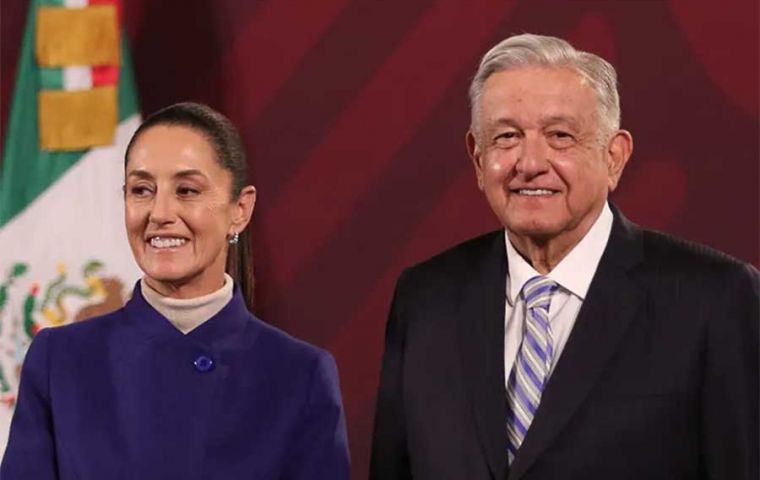MercoPress. South Atlantic News Agency
Mexico has elected its first female president, but has behind a very powerful mentor
 Claudia Sheinbaum, the former mayor of Mexico City and president Andrés Manuel López Obrador, AMLO
Claudia Sheinbaum, the former mayor of Mexico City and president Andrés Manuel López Obrador, AMLO By Luis Romero Gómez (*) -On October 17, 1953, constitutional reform granted women the right to vote in Mexico, and two years later, women cast votes in a federal election. Now, nearly 70 years later, Mexico has elected a woman president for the first time, according to Sunday's election results.
Claudia Sheinbaum, the former mayor of Mexico City with a PhD in energy and environmental engineering, is also the first Jewish person to lead Mexico, where 70% of the population is Catholic.
The election was mainly contested between two candidates, both of whom were women. Sheinbaum, the front-runner, represented the left-wing coalition “Let's Keep Making History”. This was formed by the ruling party, Morena, and minor partners, the Green Party (PVEM) and the Labor Party (PT).
Her main rival, Xóchitl Gálvez, of very modest background and also a brilliant engineer with US academic post graduate studies, was defeated by 30% of votes cast, represented the coalition “Strength Heart for Mexico”. This is composed of the Institutional Revolutionary Party (PRI), National Action Party (PAN) and the Party of the Democratic Revolution (PRD).
This has been the largest election in Mexico’s history, with more than 98 million citizens registered to vote. Nearly 20,000 elected positions were being contested, including the presidency, both chambers of Congress and thousands of local seats. It was also the most violent election, with more than thirty politicians killed.
The new president will now face two major challenges: confronting the rampant violence in Mexican society and increasing militarization of public life, and the deterioration of checks and balances on executive power.
Sheinbaum’s mentor, current President Andrés Manuel López Obrador, has not solved the first issue, and has significantly worsened the second, but he has managed to become a first line populist leader.
Part of Gálvez’s defeat is attributed to the tarnished reputation of the PRI, PAN, and, to a lesser extent, the PRD. These parties are associated with a period known as Mexico democratic transition from 1988-2018. The democratic transition resulted in new laws reinforcing independent decision-making in electoral practices in the 1990s.
The transition governments, however, were marked by the mediocre performance of political leaders, as well as a growing inequality in society. The military also were called in to more involvement in law enforcement in response to the worsening Mexican drug war, leading to unprecedented violence.
López Obrador was elected in 2018 after two failed campaigns. He has never accepted his 2006 defeat, alleging the opposition parties stole the election and when he again lost in 2012, by seven points, he claimed there was electoral rigging and overall fraud.
López Obrador has seen himself as the continuation of Mexico’s three great periods of emancipation: independence from Spain (1810-1821), the Reform War that marked the separation between church and state (1857-1861), and the Revolution (1910-1920) that ended a 30-year dictatorship and ushered in the current Constitution. López Obrador labeled his regime as the “Fourth Transformation” of Mexico.
He deeply despises the imperfect and fragmented achievements of Mexico’s democratic transition, a period he considers a betrayal of Mexican History, tainted by neo-liberal policies and corruption. He has frequently denounced the opposition, even during the electoral period, despite laws against this.
López Obrador still maintains a record 65% approval rating. Many Mexicans considered his economic and social programs a success, such as scholarships and pensions for lower-income residents. So while his popularity benefited Sheinbaum’s campaign, his shadow will now loom over her government.
By 2018, some 227,000 Mexicans had lost their lives due to the drug war initiated by former president Felipe Calderón. López Obrador began his term promising to withdraw the army from policing duties. “Hugs, not bullets,” became the slogan. But that changed quickly, López Obrador dismantled the most corrupt federal police and replaced it with a new force called the National Guard, primarily of military personnel. He also pushed for the new force to be attached to the National Defense Secretariat, SEDENA.
López Obrador has argued the military guarantees loyalty and honesty, which is highly questionable given allegations of corruption and summary executions against the military, particularly the Army. And in the past six years, violence has reached unprecedented levels in the country. Official data shows between 2018 and 2023, there were more than 171,000 homicide. In addition, more than 50,000 Mexicans went missing since López Obrador took office — this is roughly one person per hour.
Sheinbaum however denies Mexico is becoming more militarized and has promised to promised to pursue López Obrador’s plan to attach the National Guard to the Sedena.
López Obrador in his six years has gradually concentrated power in the office of the president. In the second half of his term, the opposition said it would no longer support his government’s legislative initiatives. The ruling bloc decided to ignore the opposition and pass reforms with the support of minor parties that were later invalidated by the Supreme Court. This included a legislative overhaul of the national electoral authority, which critics said would give more power to officials affiliated with Morena.
Then, on February 5, the anniversary of the signing of the Mexican Constitution, the president presented several constitutional reforms to Congress aimed at fundamentally changing the judiciary’s structure. López Obrador did not have the necessary congressional majority to achieve the reforms, but Sheinbaum has promised to carry out the amendments.
(*) Luis Romero Gomez, Senior Lecturer in Human Rights, Constitutional Law and Legal Theory, University of Wollongong, Australia




Top Comments
Disclaimer & comment rulesCommenting for this story is now closed.
If you have a Facebook account, become a fan and comment on our Facebook Page!